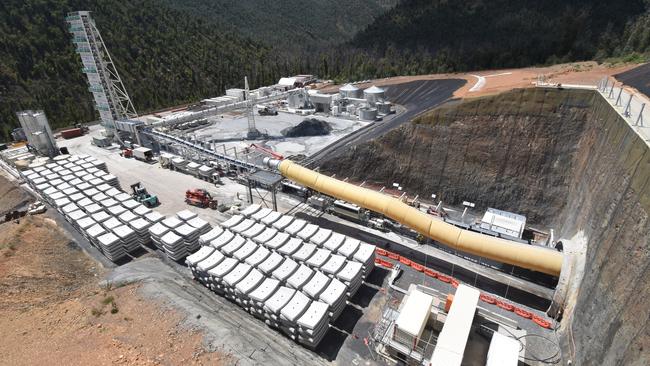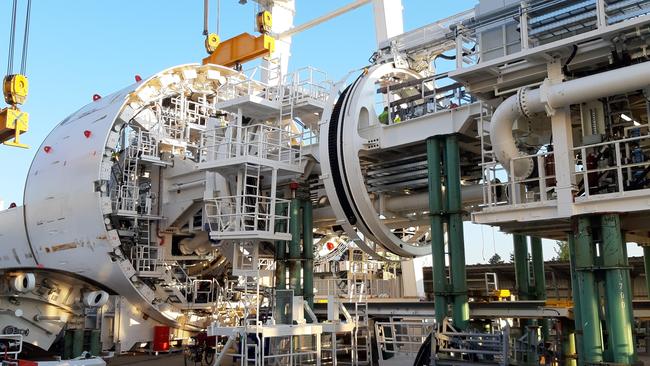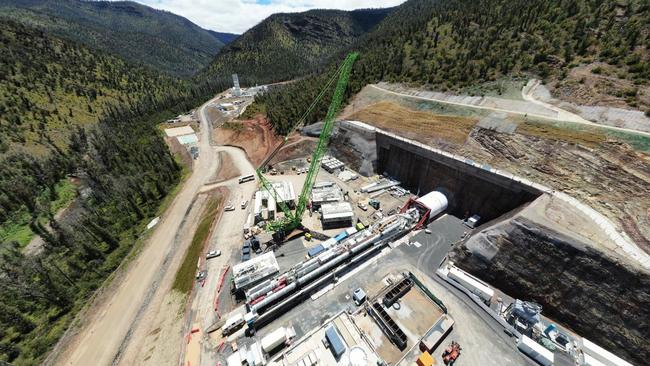Clough is mostly saved with Webuild deal, but administrators say contracting model must change
The collapse of Clough should sound the death knell for lump-sum contracting arrangements, according to its administrator Jason Tracy.

Business
Don't miss out on the headlines from Business. Followed categories will be added to My News.
The collapse of Clough should sound the death knell for lump-sum contracting arrangements, according to Clough administrator Jason Tracy.
After a frenetic 59 days of negotiations, Deloitte closed its long-awaited deal with Webuild on Friday, handing over almost all of the venerable engineering company’s assets, people and projects for $35.9m.
In addition to Snowy Hydro 2.0 and a section of the federal government’s Inland Rail project – agreed before Christmas – Webuild will now also take responsibility for finalising Beach Energy and Mitsui’s Waitsia gas project in WA, EnergyAustralia’s Tallawarra gas plant in NSW and the Royal Australian Navy’s Lombrun base in Papua New Guinea.
Clough isn’t the first major contractor to collapse in the fallout from the supply disruptions of the Covid-19 era, and won’t be the last – and certainly not, Mr Tracy says, if changes aren’t made to contracting norms across the economy.
“This is a controversial topic because it sort of cuts across the roles of debt providers and government and principals, and where risk sharing really should be on some of these projects. But I think there’s a fair argument to say that the old lump-sum contracting model is broken,” he told The Australian.
“We saw it on Probuild. We’re seeing it in other infrastructure and principal contracting situations, and we saw it here on Clough.”
Rather than a principal – backed by bankers – simply agreeing a price, handing off the job to a contractor, and then arguing about responsibility for variations, they will need to take a far more active role in a project’s construction than under fixed-price contracts, he said.
“You might contractually negotiate an engineering and procurement contract (EPC) and think you’re off-risk. But of course you’re totally on-risk if something goes wrong. Because who’s gonna come knocking on the door and ask you for money to keep the project going? That is what administrators have to do.”

For Mr Tracy, the fact the bulk of Clough’s business, people and projects have been saved in under two months is a minor miracle – particularly given the Christmas season.
Webuild will hand over only $35.9m to close the deal, but Mr Tracy says it is effectively a $2bn agreement, taking into account the transfer of staff entitlements, $51m in suppliers and contractors already paid off, a reduction in secured security liabilities and the big one – more than $1.5bn in potential damage claims from Clough’s clients that have been avoided.
From the outside, the deal looked relatively simple to get done, particularly given Webuild had already been working due diligence investigations on Clough for more than a month when Deloitte was called in.
But negotiations across multiple clients, joint venture partners and other stakeholders – including governments and unions – made the deal far more complicated, Mr Tracy said.
“There were probably eight to 10 different law firms engaged in it for different counterparties,” he said.
“You’re probably talking about 12 to 14 different sets of advisers, because not only do people have lawyers, but they’ve got other types of advisers – transaction advisers or accounting advisers trying to understand the commercial implications.”
The only way it got done, he said, was to send tight deadlines for a Webuild buyout, to force the issue.
“We were operating on a burning platform. We didn’t just publish these dates, but we talked to all of the stakeholders. So we were talking to each of the project principals, joint venture partners, etc. And we basically said ‘You need to come up with binding term sheets’ – because all of the EPC contracts needed to be renegotiated,” he said.
The first major hurdle was in ensuring the subcontractors owed $51m were paid by the principals – a key issue at Waitsia, where subbies were preparing to demobilise as soon as they heard about Clough’s collapse.
“The first thing we had to do was have some really robust negotiations with those who had skin in the game. That basically involved us requiring funding for direct wages, indirect wages and an overhead,” he said.
“So we effectively took the existing EPC contract and said: ‘That’s very nice. We understand that, we respect it. But we don’t adopt it, we’re putting it on the shelf. We need to come up with an interim funding arrangement to keep this group alive. And we need to do that within days’.”
That may seem a simple equation for clients who need to get their projects completed on time, particularly for those waiting on cash flows from completion.
In practice it’s not that easy.

“When you actually turn up and say that what that actually means is they need to put some serious cash into the business to keep it going, people go: ‘Well hang on a minute, is that fair? Is that reasonable? I need to do some more work. I can’t take that to my board, I need to understand the full detail behind it’,” Mr Tracy said.
“And we basically had to say – and it wasn’t grandstanding – that this was not a negotiation. These are the numbers. You either pay your fair share, or you’re going to be out and you can explain to your board what that looks like.”
Mr Tracy has nothing but praise for the parties on the other side of the table, as well as for the Clough staff and management that worked through the uncertainty to get it all done.
In the end, he said, it was that flexibility that allowed Clough to trade through to a Webuild deal. And that flexibility needs to be built into the contracting system to avoid another major failure, according to Deloitte’s Sal Algeri.
“One of the principals that we had those early conversations in that first week (with) – and the words still ring in my ears – got up and said: ‘Those people that sweat the small numbers today are going to be sweating the big numbers tomorrow’,” he said.
“That’s what the lump sum model allows for. When you want to negotiate a change it is really complicated. But if everyone doesn’t change – which is what happened here – the house of cards comes down.”
In a regulatory regime that has to account for the behaviour of the construction world’s worst-behaved as well as those looking for “genuine collaboration with cool heads and warm hearts”, Mr Tracy and Mr Algeri concede reforms won’t be easy.
The reforms need to cut across not just the contracting world and clients, but also governments and bankers, Mr Tracy said, even if that means clients need to put up a greater portion of project funding in equity.
“It would be made easier if the contracting model actually provided for some better mechanisms around bringing the parties together. And also some greater flexibility on dealing with the stuff that you can‘t control – so that you can flex on pricing, but that changes your capital model for the project,” Mr Tracy said.
More Coverage
Originally published as Clough is mostly saved with Webuild deal, but administrators say contracting model must change




